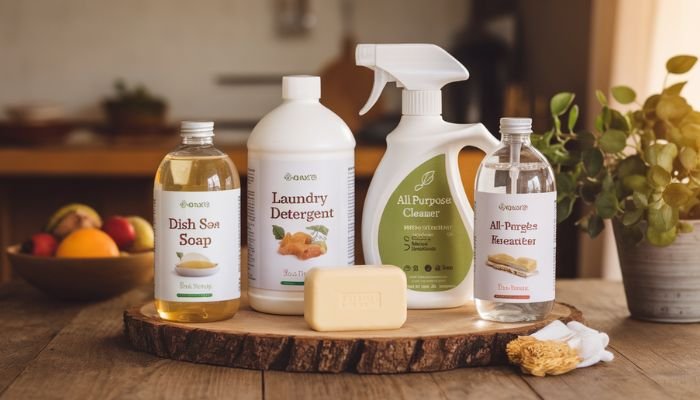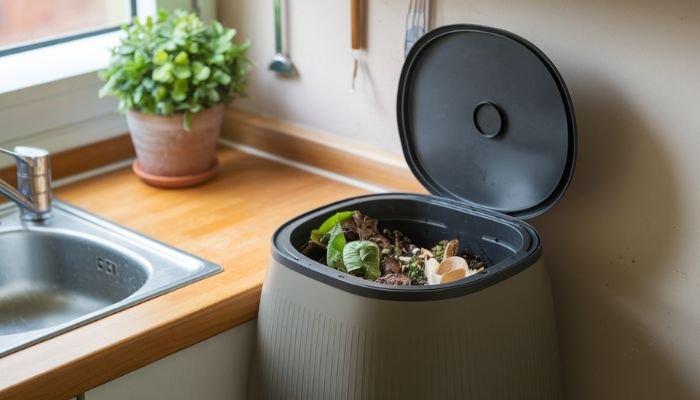As more people become environmentally conscious, eco-friendly cleaning products have gained popularity. These products promise to clean just as effectively as traditional cleaners without using harsh chemicals that can harm both the planet and your health. But do they really deliver on this promise? Here’s an in-depth look at the effectiveness, pros and cons, and common questions around eco-friendly cleaning products to help you make informed choices.
Table of Contents
What Are Eco-Friendly Cleaning Products?
Eco-friendly cleaning products are designed with natural, biodegradable ingredients and avoid synthetic chemicals like ammonia, chlorine, and phosphates, which can be harmful to people, pets, and the environment. Many eco-friendly brands also focus on sustainable packaging and cruelty-free production, making them better for the planet from production to disposal.
Common Eco-Friendly Ingredients
- White vinegar: Acts as a natural disinfectant and deodorizer.
- Baking soda: Excellent for scrubbing and deodorizing.
- Citric acid: Found in citrus fruits, great for removing limescale and soap scum.
- Essential oils: Lavender, tea tree, and eucalyptus oils add a natural scent and have antibacterial properties.
How Do Eco-Friendly Cleaners Compare to Conventional Cleaners?
When it comes to cleaning power, eco-friendly products can be just as effective as traditional cleaners, but there are a few nuances:
1. Disinfection and Sanitization
Most eco-friendly cleaners are not EPA-certified disinfectants. They rely on ingredients like vinegar, essential oils, or hydrogen peroxide, which can kill some germs but may not be as strong as chemical disinfectants like bleach. However, many eco-friendly products are effective enough for general household cleaning.
2. Stain and Grease Removal
Eco-friendly products like baking soda and castile soap can be effective at removing stains and grease, but they may require more scrubbing or a longer soak time compared to heavy-duty chemical cleaners. That said, with regular use, eco-friendly cleaners can prevent buildup and reduce the need for intense scrubbing.
3. Odor Elimination
Eco-friendly cleaners neutralize odors using ingredients like baking soda and essential oils instead of artificial fragrances. This means they’re often less overpowering but still leave a fresh, natural scent.
Pros of Using Eco-Friendly Cleaning Products
1. Better for Your Health
Many eco-friendly cleaning products are non-toxic, reducing your exposure to harsh chemicals that can irritate the skin, eyes, and respiratory system. This is especially beneficial for people with allergies, asthma, or sensitive skin.
2. Reduced Environmental Impact
Eco-friendly cleaners are biodegradable and don’t contribute to water pollution or release harmful toxins into the air. Their natural ingredients break down more easily and do not disrupt ecosystems.
3. Safer Around Children and Pets
With fewer toxic ingredients, eco-friendly cleaners are generally safer for use around children and pets. They reduce the risk of accidental poisoning, which is a common concern with chemical cleaners.
4. Sustainable Packaging
Many eco-friendly brands prioritize recyclable, compostable, or refillable packaging, helping to reduce plastic waste. Some even offer concentrates that can be diluted in reusable bottles, further minimizing environmental impact.
Cons of Using Eco-Friendly Cleaning Products
1. Cost
Eco-friendly cleaning products can sometimes be more expensive than conventional options. However, this cost can be offset by DIY cleaners or buying concentrated formulas that last longer.
2. Not as Potent for Certain Germs
Eco-friendly cleaners may not kill bacteria and viruses as effectively as conventional disinfectants. While they are suitable for everyday cleaning, areas that require sterilization, like cutting boards, bathrooms, or kitchens, may benefit from occasional use of stronger disinfectants.
3. Availability and Convenience
Some eco-friendly cleaning products can be harder to find in local stores, although online shopping has made them more accessible. If you live in a remote area, you might have fewer options for eco-friendly products.
Real User Experiences and Reviews
1. All-Purpose Cleaners
Eco-friendly all-purpose cleaners like Seventh Generation and Method receive positive reviews for their effectiveness in removing dirt and grime from multiple surfaces. Many users find them comparable to traditional cleaners for everyday use, though some say they aren’t as effective for deep cleaning tough stains.
2. Glass Cleaners
Products like Aunt Fannie’s Glass Cleaner and DIY options with vinegar and water get rave reviews for leaving mirrors and glass streak-free without the ammonia smell of traditional glass cleaners. However, some users report that eco-friendly glass cleaners require a bit more buffing.
3. Laundry Detergents
Eco-friendly laundry detergents, like Ecover and Mrs. Meyer’s, are praised for their gentle formulas that are safe on skin and fabrics. They’re effective on general loads but may struggle with heavy-duty stains, which could require pre-treating.
Frequently Asked Questions (FAQ)
Q: Can I trust DIY eco-friendly cleaners for disinfecting surfaces?
A: While DIY cleaners with ingredients like vinegar or hydrogen peroxide have mild antibacterial properties, they are not as strong as EPA-registered disinfectants. For areas that require strict sanitation, consider using certified disinfectants occasionally alongside eco-friendly cleaning.
Q: Do eco-friendly cleaners leave behind a chemical smell?
A: No, most eco-friendly cleaners use natural scents from essential oils like lavender or citrus, which are much milder than artificial fragrances used in conventional products. If you prefer unscented cleaners, there are plenty of fragrance-free eco-friendly options available.
Q: Are eco-friendly products safe for all surfaces?
A: Generally, yes, but it’s always best to check the label. Vinegar-based cleaners, for example, can damage marble, granite, and other natural stones. Castile soap or baking soda-based cleaners are often recommended for more delicate surfaces.
Q: How can I make my own eco-friendly cleaning products?
A: Basic DIY recipes include mixing white vinegar and water for glass cleaner, baking soda and vinegar for scrubbing, and castile soap with essential oils for an all-purpose spray. These recipes are effective for everyday cleaning and cost-effective.
Final Verdict: Do Eco-Friendly Cleaning Products Really Work?
Yes, eco-friendly cleaning products work well for most household cleaning tasks, especially when used regularly. They can effectively clean dirt, grease, and odors without exposing you or the environment to harmful chemicals. However, they may not be as potent for heavy-duty disinfecting or stubborn stains, which might require additional scrubbing or an occasional stronger disinfectant.
For those who prioritize sustainability and health, eco-friendly cleaning products are an excellent choice. With natural ingredients and safer formulas, they offer effective cleaning solutions while minimizing environmental impact. While the cost may be slightly higher in some cases, the long-term benefits of a greener, healthier home make eco-friendly cleaning products well worth the investment.




